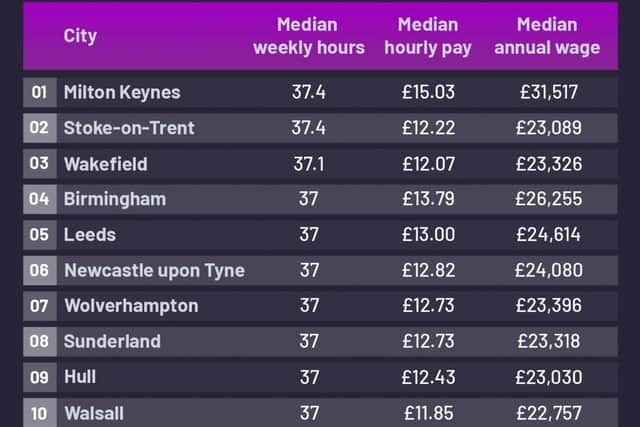Milton Keynes named the hardest-working city in the UK with average earnings at £31.5K a year
and live on Freeview channel 276
Using data from the Office for National Statistics (ONS), payment specialist Merchant Machineanalysed the UK's working patterns to discover which areas and industries put in the most hours every week.
Milton Keynes came out top of the list, with an average working week of 37.4 hours and an average median annual wage of £31,517.
Advertisement
Advertisement
Over a year this means workers in Milton Keynes are working 125 extra hours than areas at the bottom of the list, such as Liverpool.


The construction industry was named the hardest working industry of them all with workers clocking an upper limit of 49 hours per week.
Agriculture had the highest upper-limit of hours worked of all industries, with some employees clocking up to 53.6 hours per week. That is 13.6 hours more per week than the average full-time week
On the other side of the spectrum, those who fell into the household employers industry had the shortest median week worked with the median value being just 16 hours.
Advertisement
Advertisement
Claire Williams, director of people and services at CIPHR, a UK-based HR company, said: “The pace of working life – which naturally varies from day to day, and week to week – also plays a significant role in determining if we feel overworked and if our work-life balance is right. In theory, your contracted hours should represent the amount of time that your employer has deemed necessary to complete your job, therefore, ideally, you wouldn’t be working significantly longer than those hours, and certainly not on a regular basis.”
Women worked fewer hours per week than men across the board, the survey showed.
The finance and insurance industry showed the biggest discrepancies between men and women's pay. The median hours worked per year came in at 1,820 per year (35 per week) for both genders in the industry and yet men earned just over £20,000 more per year than women.
On an hourly basis, this means that women in the finance and insurance industry could be earning around £8.41 less per hour than industry males.
Advertisement
Advertisement
Some industries in the study were shown to be paid a higher hourly pay, meaning their annual earnings were higher than those who worked more hours. Industries such as Finance and Insurance worked a median of 35 hours per week (one of the lowest of all industries) and yet employers earned a median of £38,921.
On the other side of the spectrum, the Construction industry was shown to work a median of 40 hours per week and yet received a median hourly pay of just £14.78. Over a year, this means they earned around £31,083, that's over £7,000 less per year than the finance industry. And yet, they were shown to work around 260 hours extra than the finance and insurance industry.
Ian Wright at MerchantMachine said: “How much people get paid is covered and spoken about widely but hours worked is less common. We wanted to shed light on just how much the UK is really working per week and so undertook this research into the total hours worked (basic hours plus paid overtime hours). This reveals that though many of the median hours worked are within the normal range, some of the upper-limits show that much of the UK may be overworking.”